
Richard Spurr 1am - 4am
24 December 2020, 15:18 | Updated: 24 December 2020, 17:34
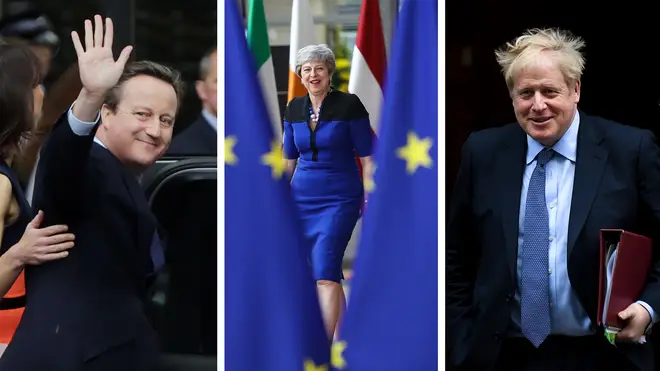
Number 10 has announced a Brexit trade deal with the EU has been reached.
1,645 days after Britain voted to leave the EU and following many missed deadlines, here is a look at the key moments in the saga:
January 23 2013 - Under pressure from his backbenchers and the rise of Nigel Farage’s UKIP, Prime Minister David Cameron promised an in-out referendum on EU membership if the Conservatives win the 2015 general election. They went on to do so on May 7 2015, setting the process rolling to hold a vote.
June 23 2016 - In a result that shocks many, the UK votes to leave the EU by 52 percent. Mr Cameron quickly resigns as prime minister on the steps of Downing Street.
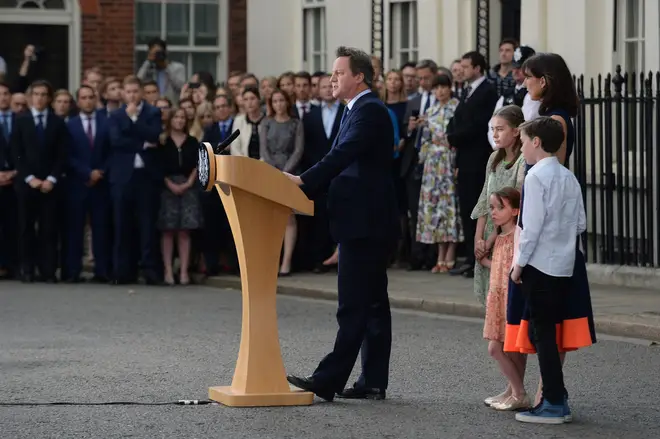
July 13 2016 - Theresa May takes over as prime minister. Despite having backed Remain, she promises to "rise to the challenge" of negotiating the UK's exit.
November 10 2016 - The High Court rules against the Government and says Parliament must hold a vote to trigger Article 50 of the Treaty on European Union, the mechanism that begins the exit from the EU. Mrs May says the ruling will not stop her from invoking the legislation by April 2017.
March 29 2017 - Mrs May triggers Article 50. European Council president Donald Tusk says it is not a happy occasion, telling a Brussels press conference his message to the UK is: "We already miss you. Thank you and goodbye."
PM on triggering Article 50: This is an historic moment from which there can be no turning back. https://t.co/w3hTUsh8oZ pic.twitter.com/Y1TabdLiPk
— UK Prime Minister (@10DowningStreet) March 29, 2017
June 8 2017 - Mrs May holds a snap election which backfires, forcing her to form a minority Conservative administration propped up by the Democratic Unionist Party. Her small majority in Parliament sets up a rocky few years.
March 19 2018 - The EU's chief negotiator, Michel Barnier, says he and Brexit secretary David Davis have taken a "decisive step" towards agreeing a joint legal text on the UK's EU withdrawal but warns there are still outstanding issues relating to the Irish border.
July 6 2018 - A crunch Cabinet meeting at Chequers agrees Mrs May's new Brexit plans, including the creation of a new UK-EU free trade area for goods. However, two days later David Davis resigns from the government and the following day Boris Johnson quits as foreign secretary, claiming the plans mean "we are truly headed for the status of colony" of the EU.
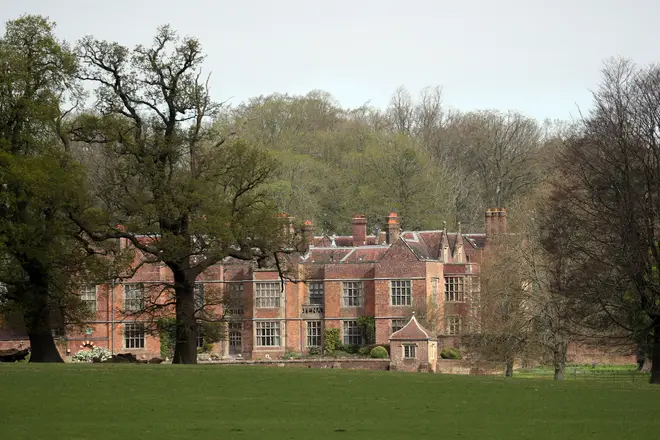
November 14 2018 - In a statement outside 10 Downing Street, Mrs May says that Cabinet has agreed the draft Brexit Withdrawal Agreement. The next day Dominic Raab resigns as Brexit secretary, saying he "cannot in good conscience support the terms proposed for our deal with the EU".
November 25 2018 - The 27 EU leaders endorse the Brexit deal.
December 12 2018 - Mrs May survives an attempt to oust her with a vote of no confidence as Tory MPs vote by 200 to 117 in the secret ballot in Westminster.
January 15 2019 - MPs reject Mrs May's Brexit plans by an emphatic 432 to 202 in an historic vote which throws the future of her administration and the nature of the UK's EU withdrawal into doubt.

Brexit Protesters Erupt Into Cheers As PM Suffers Huge Defeat
March 20 2019 - Mrs May writes to the EU requesting an extension of Article 50, to allow Brexit negotiations to continue to June 30.
March 29 2019 - MPs reject Mrs May's Withdrawal Agreement for a third time - by 286 votes to 344 - on the day the UK was due to leave the EU.
April 10 2019 - The EU agrees a "flexible extension" to Brexit until October 31. Mrs May says the "choices we now face are stark and the timetable is clear".
May 23 2019 - Nigel Farage's Brexit Party comes out on top in the European elections, while the pro-EU Liberal Democrats also make gains. The following day, Mrs May announces she is standing down as Tory Party leader on June 7. She says: "It is and will always remain a matter of deep regret to me that I have not been able to deliver Brexit."
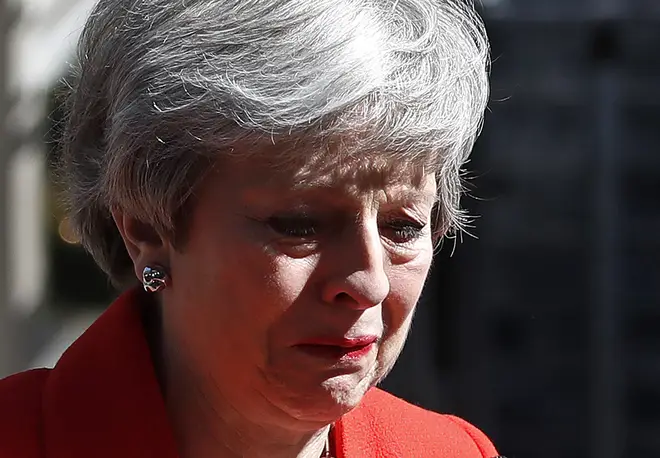
July 23 2019 - Boris Johnson is elected as leader of the Conservative Party and becomes the UK's new Prime Minister after defeating Jeremy Hunt.
August 20 2019 - European Commission president Jean-Claude Juncker rebuff’s Mr Johnson’s demands to make major changes to Irish border arrangements in a new Brexit deal.
August 28 2019 - The Queen is dragged into the Brexit row as Mr Johnson requests the prorogation of Parliament from early September to mid-October.
September 4 2019 - Mr Johnson orders a purge of rebel Tories who opposed the Government including former chancellors Philip Hammond and Sir Kenneth Clarke. He attempts to trigger an early general election but fails to get the required support of two-thirds of MPs.

James O'Brien's Instant Reaction To Supreme Court's Prorogation Ruling
September 24 2019 - The Supreme Court rules that the PM's advice to the Queen to suspend Parliament until October 14 was unlawful because it had the effect of frustrating Parliament.
October 2 2019 - Mr Johnson puts forward his formal Brexit plan to the EU, revealing his blueprint to solve the Irish border issue.
October 10 2019 - Mr Johnson and Taoiseach Leo Varadkar say they can see a "pathway to a deal", in a joint statement after key talks at a luxury hotel in Cheshire.

Watch the moment John Bercow rejects Boris Johnson's Brexit "meaningful vote"
October 17 2019 - After intense negotiations, the Prime Minister announces the UK has reached a "great deal" with the EU which "takes back control" and means that "the UK can come out of the EU as one United Kingdom - England, Scotland, Wales, Northern Ireland, together".
October 19 2019 - Mr Johnson seeks the support of MPs in a "meaningful vote" on his new deal but instead they back an amendment forcing him to seek a delay. Attempts to fast-track his Brexit deal through Parliament fail after MPs vote against his timetable.

Corbyn and Labour back December general election
December 12 2019 - On the fourth attempt Boris Johnson manages to call an election. He wins a landslide 80-seat majority on a promise to "get Brexit done"
January 8 2020 - European Commission president Ursula von der Leyen visits No 10 to warn Mr Johnson the timetable for a post-Brexit trade deal is "very, very tight". The Prime Minister is clear however there will be no extension to the transition period, which expires at the end of 2020.
January 9 2020 - Mr Johnson gets his Brexit deal through the Commons as the European Union (Withdrawal Agreement) Bill is given a third reading with a majority of 99.

Counting starts across the UK for the 2019 General Election
March 2020 - Michael Barnier and David Frost open formal talks in Brussels on Britain's future relationship with the bloc, including a free trade agreement.
June 12 2020 - Cabinet office minister Michael Gove formally tells the EU the UK will not sign up to an extension to the transition period, but he backtracks on plans to immediately introduce full border checks with the bloc on January 1.
September 10 2020 - The European Commission threatens the UK with legal action after ministers announce plans for legislation enabling them to override provisions in the Withdrawal Agreement relating to Northern Ireland in breach of international law.

Theresa May slams Government over Brexit bill
October 16 2020 - Mr Johnson says he is halting talks on a trade deal accusing EU leaders meeting for a summit in Brussels of seeking to impose "unacceptable" demands.
November 7 2020 - Boris Johnson and Mrs von der Leyen agree to "redouble" their efforts to get a deal while acknowledging that significant differences remain over fisheries and the so-called "level playing field" for state aid rules.
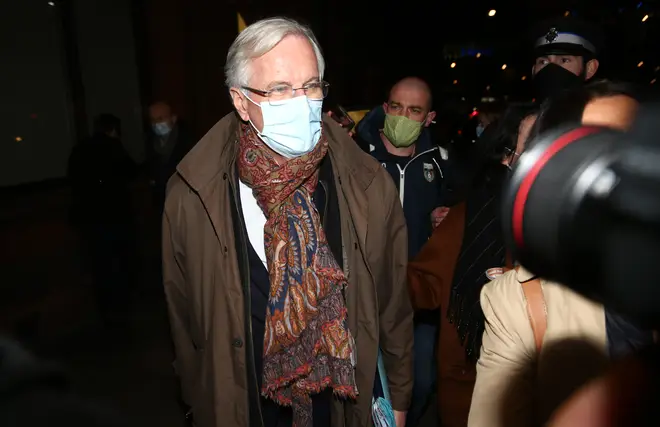
December 4 2020 - Lord Frost and Mr Barnier announce in a joint statement the conditions for an agreement had still not been met and negotiations will be put on "pause" to allow political leaders to take stock, with Mr Johnson and Mrs Von der Leyen to engage in emergency talks.
December 9 2020 - Mr Johnson and Mrs Von der Leyen dine at the European Commission, with talks between the two leaders lasting around three hours and ending in an agreement to have further discussions, but that a "firm decision" should be taken about the future of the talks by Sunday.

Boris Johnson confirms post-Brexit deal negotiations have been extended
December 13 2020 - Following a phone call, Mr Johnson and Mrs Von der Leyen agree to another extension of talks to "go the extra mile" to find a breakthrough. Mr Johnson says there is a "deal to be done" with the EU but adds the two sides are "very far apart" on key issues and Britain is still ready to trade on WTO terms in the new year.
December 17 2020 - The Prime Minister and European Commission president Mrs von der Leyen talk on the phone again to take stock of the discussions, just hours after Mr Gove tells MPs the chances of a deal were "less than 50%".
December 24 2020 - On Christmas Eve a deal was finally struck.